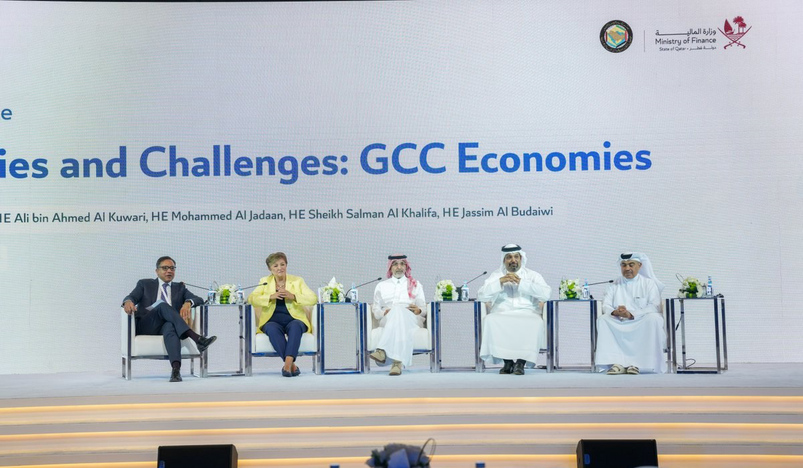
GCC 2035 Conference
HE Minister of Finance Ali bin Ahmed Al Kuwari inaugurated on Thursday the GCC 2035 Conference. The event, held in cooperation between the Ministry of Finance, the General Secretariat of the GCC, and Georgetown University in Qatar, focused on the theme "Exploring the Future of Regions, Global Industries, Trade, and Investments." The conference was attended by several dignitaries and officials from various countries and organizations.
In his opening speech, HE Al Kuwari addressed the attending ministers and delegations, stating: "This conference aims to galvanize our thinking on how we can work together to confront the challenges and opportunities of the next decade." The conference seeks to highlight the role of the Gulf Cooperation Council in building a robust regional model during a time of economic recovery, technological advancement, and climate progress, amidst geopolitical tensions. It also provides an interactive platform that brings together decision-makers and university students, enhancing community participation and contributing to the shaping of a bright future characterized by cooperation and innovation.
Also, HE Minister of Finance Ali bin Ahmed Al Kuwari participated in a discussion session during the GCC 2035 Conference.
This panel discussed how GCC countries leveraged regional cooperation to enhance economic resilience amidst global geopolitical shifts while balancing regional economic priorities against global demands. Key topics included the creation of a unified economic strategy that aligned national and regional goals, the management of geopolitical risks, and the strengthening of regional cooperation to establish a competitive advantage.
From this standpoint, HE the Minister of Finance affirmed in his speech that the differences in laws and regulations among the Gulf Cooperation Council (GCC) countries pose challenges to harmonizing policies in areas such as labor markets, taxation, and foreign investment. This can lead to delays in cooperation efforts; however, coordination between the GCC Secretariat and bilateral committees helps achieve progress in many areas.
The panel also explored policies to diversify economies beyond hydrocarbons, emphasizing the importance of social and cultural development to attract more people to the region. Additionally, the discussion highlighted valuable lessons learned from other regional economic integration efforts.
During the session, HE Saudi Arabia's Minister of Finance, Mohammed Al Jadaan, emphasized the GCC countries' unique position in leveraging opportunities amid the current global economic challenges, adding that the region shines amidst a series of challenges facing the global economy. He explained that despite parts of the Middle East facing difficult times and severe humanitarian crises, GCC countries have played a pivotal role in easing tensions, focusing on their economies and citizens, and extending support to the broader region and the global economy.
He underlined that the GCC states have taken bold and serious steps to diversify their economies, which were long reliant on fossil fuels and their natural resources. While demand for fossil fuels remains robust, it is still subject to volatility and revenue fluctuations, making it difficult for countries heavily dependent on a single commodity to execute their strategies sustainably and predictably.
That's why diversification is key, which is happening in Qatar, Bahrain, Oman, the United Arab Emirates, Kuwait, and Saudi Arabia, where significant efforts are being made to ensure the diversification of their economies. He added that the International Monetary Fund's 2023 outlook reports clearly state that the GCC countries have shown resilience in weathering the multiple shocks that the global economy has faced.
During the session, HE Minister of Finance and National Economy of Bahrain, Sheikh Salman bin Khalifa Al Khalifa, emphasized the significant economic growth occurring in the GCC region, with the combined gross domestic product (GDP) of the six GCC countries currently exceeds USD 2 trillion annually, with projections suggesting it will rise to USD 3 trillion by 2030 and surpass USD 5 trillion by 2050.
He elaborated on the ongoing economic transformation in the Gulf states, saying that the region's economies historically were exporters of natural resources and importers of products and services. He highlighted that there is now a rapid shift towards non-oil sectors. His Excellency stressed that one of the key factors for economic integration was lowering friction around trade in goods and services.
He highlighted that, previously, all GCC members were largely import-driven economies, requiring a unified import policy, which contrasts with today were members now exchange products and services.
HE International Monetary Fund (IMF) Managing Director Kristalina Georgieva, speaking during the same session, praised the GCC countries' relentless pursuit of reforms that have transformed their economies, making them more resilient to shocks. She also commended the region’s focus on inclusive growth, particularly its efforts to ensure that Gulf youth have promising future prospects.
Georgieva pointed out the significant shift of GCC economies towards non-hydrocarbon sectors, highlighting that the region’s trade with the rest of the world now exceeds USD 70 billion, a stark contrast to the USD 3 to 4 billion in intra-GCC trade seen in the 1980s. This, she noted, reflects the region's ongoing efforts to diversify its economies.
The session discussed how the GCC has leveraged regional cooperation to bolster economic resilience amidst global geopolitical shifts, while balancing regional economic priorities with global demands. Key topics included the development of a unified economic strategy aligned with national and regional goals, managing geopolitical risks, and strengthening regional collaboration to create competitive advantages.
Additionally, policies aimed at diversifying economies beyond hydrocarbons were explored, with an emphasis on social and cultural development to attract more people to the region. The discussion also highlighted valuable lessons learned from other regional economic integration efforts.
The session, which involved the exchange of perspectives on enhancing governmental cooperation within the GCC, was one of several held as part of the conference. It was followed by additional discussions enriched by questions from Georgetown University students, focusing on how to address the challenges of emerging industries.
(QNA)
.jpg)
Qatar Secures Place Among the World's Top 10 Wealthiest Nations
.jpg)
Hamad International Airport Witnesses Record Increase in Passenger Traffic

Saudi Arabia: Any visa holder can now perform Umrah

What are Qatar's Labour Laws on Annual Leave?
Leave a comment